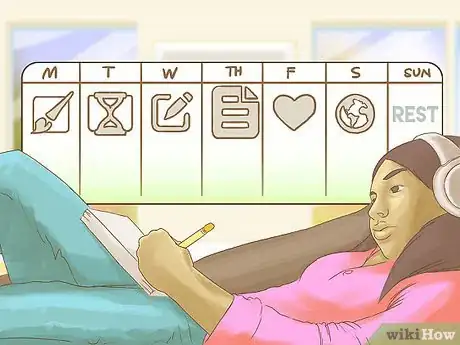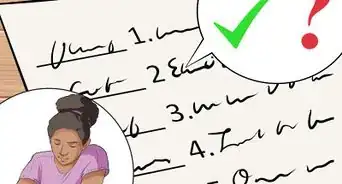This article was co-authored by Michelle Golden, PhD. Michelle Golden is an English teacher in Athens, Georgia. She received her MA in Language Arts Teacher Education in 2008 and received her PhD in English from Georgia State University in 2015.
wikiHow marks an article as reader-approved once it receives enough positive feedback. In this case, 89% of readers who voted found the article helpful, earning it our reader-approved status.
This article has been viewed 42,450 times.
If you are preparing for your final exams, you may be feeling overwhelmed. You'll need to study the material and prepare your body and mind for the rigors of test taking. The best way to guarantee success is by starting your studies early and studying efficiently. Learning how to study the material, take care of yourself, and prepare for the exam day can help you perform your best when you take your final exams.
Steps
Studying Your Material
-
1Know what is on the exam. It may sound obvious, but the first place you should begin when preparing for a final exam is to know what material will be covered. Is it a comprehensive exam that covers the whole course? Or does it just cover material since midterm? Knowing what material you'll be tested on can help you study more efficiently and cover everything you'll need to know.[1]
- Your class syllabus should at least specify whether the final exam will be comprehensive.
- Use your syllabus, along with your class notes, to deduce what material is most likely to be covered.
- If you're unsure or could use clarification, talk to your instructor and ask what material you'll be tested on.
-
2Create a study schedule. Having a schedule might make studying feel more strict, but that schedule will help you in the long run. You'll budget your time more efficiently and ensure that you cover all the material that will be on the exam.
- Set aside enough time each day to prepare for your exams. You may wish to break up your schedule, like studying for one class on Tuesdays/Thursdays and another on Monday/Wednesdays, for example.
- Plan ahead if you have multiple exams on the same day. You'll need to manage your study time even more carefully.
- Factor in time for sleep, exercise, meal time, and perhaps some healthy down time to relax after you study.
- However you put together your schedule, make sure you stick to it.
Advertisement -
3Put yourself in your teacher's shoes. After a semester (or an academic year, depending on the class), you should have a pretty solid understanding of what your teacher expects of you. You should also have a clear idea of what she thinks is most important for you to know in that class. Putting yourself in your teacher's place can help you study more efficiently, which in turn can improve the chances of your success.[2]
- Consider what material from the course your instructor expects you to know.
- Think about what sorts of questions your instructor might ask.
- Review the course in your mind and think about what the most important, representative concepts are from that class.
-
4Create a master outline from your notes. One way to ensure that you study the most important concepts is to make a master outline from your notes. You can do this by reading through your notes to pull out the things talked about most often or with the greatest relevance to other lessons in the class.
- Read through your notes once without making any marks.
- Re-read them again, only this time use a pen or highlighter to mark which concepts, terms, dates, and names are most important.
- Compile all of the marked/highlighted information from your notes onto a new sheet or paper or into a new notebook.
- Don't just copy your old notes word for word. Try to rephrase them in your own words so that you have to think critically about each concept and understand how to talk about it on your own terms.
- Use the final master outline as your main study guide for reviewing your in-class notes.
-
5Go over old tests. If your final exam is comprehensive, a good supplement to your notes would be to review all of your old tests and quizzes from throughout the semester/year. Often times those tests are structured to help you prepare for the final exam, with some instructors even taking questions word for word from the older tests/quizzes.
- Review everything that was asked on each test and quiz.
- Take note of the questions you got wrong. Was it an issue of the material, or the type of question (short answer vs multiple choice vs essay)?
- Make sure you study everything that was on the exam, as you may have forgotten the things you got right. But it may be helpful to spend some extra time reviewing the questions you got wrong.
-
6Use memorization aids. If you're trying to memorize a lot of terms, names, and dates, it might be difficult to simply read off a page and try to commit it to memory. That's where memorization aids come in. There are many different types of memorization aids, so try a few and see which ones work best for you.
- Try changing the lyrics to a song. Associating names or terms with music might help you recall that information when you're stumped during the exam.
- Use mnemonic devices. This is similar to using music, but uses any other type of association that will help you recall information, such as rhymes or acronyms.[3]
- Make and use flash cards. Write a term, name, or date on the blank side and the corresponding definition or description on the back.[4]
Changing How You Study
-
1Determine where you study best. You may feel more comfortable studying at home, or with the TV on in the background, but these situations could detract from your ability to retain information. Where you study is a big part of how efficiently you are able to study, so it's important to figure out what locations/environments work best for you.[5]
- Try studying someplace quiet, like a library or an uncrowded coffee shop.
- Unless you're part of a study group, try to work alone. Having others there, even if they're also planning to study, could easily become a distraction.
- If you do find that studying in your room works best for you, try to at least minimize distractions. Study when your roommates aren't there, and avoid potential distractions like the TV, music, or video games.[6]
-
2Study in blocks with breaks. If you try to sit down and cover an entire semester's worth of material at once, you're probably going to overload your brain. You probably won't retain very much information, either. A good way to study more efficiently (and remember more information) is to study in chunks, with breaks in between.
- Study in blocks of 20 to 50 minutes at a time, but make sure those 20 to 50 minutes are uninterrupted and free of distractions.
- Take a 5 to 10 minute break between study blocks. This will help you unwind and allow your mind to rest before attempting to memorize the next block of information.
-
3Avoid cramming for exams. Time management is essential if you want to do well on your exams. That means figuring out how often and how long to study for each subject, and avoiding having to cram all your studying into one short, compact timeframe.[7]
- Skip nonessential commitments if they threaten to take over study time. Nothing other than class or work should interfere with your designated study times.[8]
- Portion out your study time according to which subjects need the most time and effort. You don't necessarily have to study history as much or as often as calculus if one subject comes easier to you and you're more informed about the material.
- Study for either your hardest final or your first sequential final before the others. Decide whether it will be easier to rank your study sessions by difficulty or by time permitted.[9]
- Whatever you do, don't procrastinate. Cramming at the last possible minute is a surefire way to feel stressed out, exhausted, and ultimately unprepared.
-
4Consider joining a study group. Studying in small groups with other people in your class can help you figure out what other people are studying and which course elements people are struggling with. You may even learn some new study techniques from your classmates, or pick up some information that you didn't realize would be on the exam.[10]
- Try to keep groups relatively small. Three to five people is a good size that will minimize the risk of distractions or diversions.
- Make yourself be responsible to your study group. Remember that if you procrastinate or shrug off your studying duties, your classmates will suffer as well.
Caring For Your Body
-
1Get some exercise. It can be easy to forget to workout in the midst of finals preparation, but that's when it may be most important. Even if you're not a regular workout enthusiast, now is the perfect time to start.
- Studies show that even just 20 minutes of cardiovascular exercise can improve your memory.[11]
- Try jogging, bicycling, dancing, or even brisk walking to get your daily exercise in.
- Decide when to exercise. Some people prefer to exercise in the morning, while others may find it stimulating to workout right before a study session.
- Figure out what works best for you, and stick with it.
-
2Eat nutritious food. When you're stressed out from studying, it may be tempting to reach for comfort foods like french fries, potato chips, or desserts. However, studies show that eating an unhealthy diet can cause your test performance to decline.[12]
- A balanced diet that includes fruit and vegetables can help stabilize your performance.
- Diets rich in meat, eggs, cheese, and cream result in poorer attention and thought-capacity performance.
- Incorporate healthy snacks throughout your day, especially while you're studying. Grab a piece of fruit or some fresh vegetables to power you through your study sessions.
-
3Stay rested. Sleep is important if you want to feel your best and perform well. Pulling all-nighters has been shown to reduce your retention abilities, resulting in lower grades.[13]
- A well-rested student is more relaxed, alert, and able to focus and retain information.
- Most students need at least eight hours of uninterrupted sleep. Many students need even more sleep than that, depending on age and level of physical activity.
Taking Your Exams
-
1Start the day out right. How you begin your day could shape how well or how poorly you perform on an exam. It's important to feel your best if you want to perform well at school or any other activity you apply yourself to.
- Make sure you're well rested.
- Set your alarm, and consider setting a second alarm for the morning just to ensure that you get up if you sleep through the first. Use two different alarms, like a clock and your cellphone, in case the power goes out at night.
- Have a small but nutritious breakfast. A breakfast high in fiber and carbohydrates, like oatmeal, is ideal for test days because it is digested more slowly to power you through the day.[14]
- Wear comfortable clothes. You don't need to show up wearing pajamas, but you also don't need to dress your best - wear whatever will let you remain comfortable and focused for long periods of time.
- Use the bathroom before you get to the exam. This will reduce the need to get up and leave during the exam (which may not be permitted).[15]
-
2Arrive early. Running late to an exam is an easy way to stress yourself out, and depending on the test you may not be allowed to enter the exam after it begins. Set yourself up for a smooth and stress-free exam by leaving your house early and getting to the exam at least 20 minutes before it begins.
- Know the time and location where your exam will be administered. Some exams are not taken in your usual classroom, so know where you'll need to be in advance.[16]
- Get there early enough to be settled in before the exam starts. If you have time, you may even want to review your notes one last time right before the exam (but make sure you studied in advance).
-
3Come prepared. If you're stressed out about an exam, you may not be thinking about what you'll need to actually take the exam. Plan everything out ahead, and consider packing your bags the night before the exam.
- Bring any materials you'll need if it is an open-book or open-notes exam.
- Make sure you have more than one pen or pencil, and make sure they all work.
- Think of anything else you might need during the exam: a bottle of water, a cup of coffee, tissues, cough drops, etc.[17]
-
4Budget your test time. Don't focus on how long everyone else is taking to complete the exam. Focus on your own paper, and manage your time as necessary.
- Always read the instructions all the way through before you begin taking the exam. Glancing through the entire exam can help you determine how many questions there are, what format they're in, and which questions you'll need to spend the most time on.[18]
- Try doing an information dump: write out some basic notes for yourself (like formulas, important dates, etc) in the margins or on scrap paper. That way you won't have to worry about remembering them for the whole test, and you'll have the information there for when you need it.
- Develop all of your answers fully, and make sure you address all aspects of every question.
-
5Let it go when you're finished. It may be difficult to disengage with the material after you finish your exam, but dwelling on the questions and test material will only make you more anxious. It's best to just let go of the exam once you've turned it in and try to walk away from the material as best you can.
- Prepare to move on to the next exam, if you have more coming up. Dwelling on the exam you just took won't help you with any of your tests.
- If you have a serious and legitimate concern about how you performed, talk to your instructor about making an appointment to talk about it when it's convenient for both of you.
- Once you're all finished with your final exams, it's time to relax. Enjoy your break, spend time with friends, try to travel (if possible), and simply take the time to unwind and do things you enjoy.
Community Q&A
-
QuestionHow do I follow a time table effectively?
 PenguinpencilCommunity AnswerMake sure your timetable is realistic and allows for breaks and some leeway if things take longer than expected. Put the phone away and use a manual alarm to time yourself. Always have a clock within reach to keep you focused. Stay hydrated and have fruit or a small snack nearby.
PenguinpencilCommunity AnswerMake sure your timetable is realistic and allows for breaks and some leeway if things take longer than expected. Put the phone away and use a manual alarm to time yourself. Always have a clock within reach to keep you focused. Stay hydrated and have fruit or a small snack nearby. -
QuestionHow can I not get nervous during exams?
 Community AnswerTake a couple of deep breaths and try not to overstress. Remind yourself you will be able to finish the paper and that you have studied really hard, so you should do just fine.
Community AnswerTake a couple of deep breaths and try not to overstress. Remind yourself you will be able to finish the paper and that you have studied really hard, so you should do just fine. -
QuestionHow do I behave during my exam?
 Ashtyn FeltonCommunity AnswerI would recommend wearing clothes you'll feel comfortable in and using positive affirmations to relieve your anxiety and convince yourself you will do well. Review any last minute material before the exam begins. Don't talk during the exam, and don't do anything that will distract the other students.
Ashtyn FeltonCommunity AnswerI would recommend wearing clothes you'll feel comfortable in and using positive affirmations to relieve your anxiety and convince yourself you will do well. Review any last minute material before the exam begins. Don't talk during the exam, and don't do anything that will distract the other students.
References
- ↑ http://www.usnews.com/education/blogs/professors-guide/2010/12/10/top-15-hot-tips-for-finals
- ↑ https://www.psychologytoday.com/blog/head-the-class/201204/end-games-preparing-well-final-exams
- ↑ http://psychcentral.com/lib/memory-and-mnemonic-devices/
- ↑ http://www.upb.pitt.edu/uploadedfiles/final%20tips%20newsletter.pdf
- ↑ https://news.fiu.edu/2013/12/8-study-tips-that-will-help-you-overcome-finals-week/70573
- ↑ http://blog.suny.edu/2013/12/scientifically-the-best-ways-to-prepare-for-final-exams/
- ↑ http://blog.suny.edu/2013/12/scientifically-the-best-ways-to-prepare-for-final-exams/
- ↑ http://www.usnews.com/education/blogs/professors-guide/2010/12/10/top-15-hot-tips-for-finals
- ↑ http://www.upb.pitt.edu/uploadedfiles/final%20tips%20newsletter.pdf
- ↑ https://news.fiu.edu/2013/12/8-study-tips-that-will-help-you-overcome-finals-week/70573
- ↑ http://blog.suny.edu/2013/12/scientifically-the-best-ways-to-prepare-for-final-exams/
- ↑ http://blog.suny.edu/2013/12/scientifically-the-best-ways-to-prepare-for-final-exams/
- ↑ http://www.upb.pitt.edu/uploadedfiles/final%20tips%20newsletter.pdf
- ↑ http://blog.suny.edu/2013/12/scientifically-the-best-ways-to-prepare-for-final-exams/
- ↑ http://www.upb.pitt.edu/uploadedfiles/final%20tips%20newsletter.pdf
- ↑ http://www.upb.pitt.edu/uploadedfiles/final%20tips%20newsletter.pdf
- ↑ http://www.upb.pitt.edu/uploadedfiles/final%20tips%20newsletter.pdf
- ↑ http://www.usnews.com/education/blogs/professors-guide/2010/12/10/top-15-hot-tips-for-finals















































































